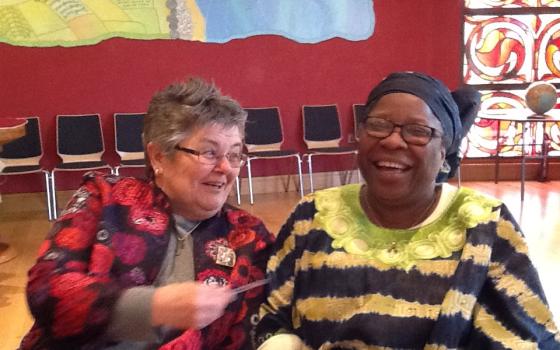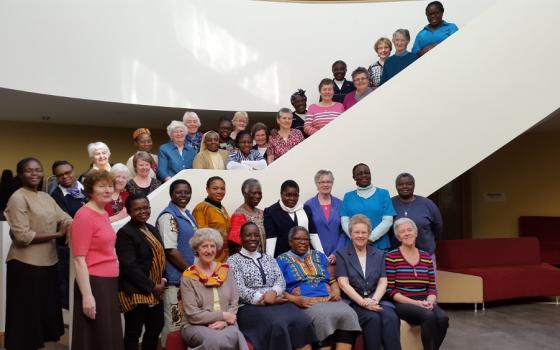Editor's note: Transformation is on the minds and in the prayers of most congregations these days, and, for international congregations, part of the transformation is integrating the shift of leadership from Global North to Global South members. The shift is geographical and cultural. Insights into these experiences are important because the shift is not only within individual congregations but also within global religious life. Sr. Winifred Ojo shares her experience of the shift and how her early life unwittingly prepared her for it.
Ojo leads the Sisters of St Louis, a congregation founded in France in 1842, although it is now based in Ireland, where she lives. She is one of the five or six women from Africa who are leaders of congregations founded in Europe or North America. Winnie grew up in the small town of Ado-Ekiti in western Nigeria and attended local village schools until she enrolled in secondary school with the Sisters of St Louis.
______
I am truly enjoying my new role as leader of our institute, but as can be expected, there are also many challenges. One is working with women of three cultures struggling to build a team to serve our multi-cultural, multi-racial congregation: two Nigerians, a Ghanaian and an American.
Together we also work with provincial and regional teams in Nigeria, Ghana, France, the United States, England and Ireland. As most leaders would agree, team building is never easy — even for those from the same countries. It is an ongoing process of learning for all of us and for the congregation.
One of my cutting-edge struggles in intercultural and interracial interactions is being true to myself while engaging with others who are different, and accepting my own vulnerabilities. What helps me is to stay in touch with the richness of my own depths and to set aside feelings of negativity and judgment that came from experiences of stereotyping and exclusivity that have been hurtful, but which are bound to happen in mixed cultural and racial groups.
No doubt, we all have examples of this, and they are usually a consequence of not knowing or understanding well the differences of culture and how these differences influence behavior. For example, I am from a tribal group that is typically noisy, exuberant and forthright, always determined to make the best of any situation. I have found that our open and forceful conversation and behavioral styles, whether in conflict or joy, can sometimes feel pushy or aggressive to people from other cultures that are less expressive. It takes time to learn how to curb some of our cultural preferences and to find ways to mitigate misunderstanding.
Also at this time in our history, as numbers shift from the North to the South, we are facing fears for the future, grief over the loss of members and past achievements and also concerns about future development. We are very aware of how our elder sisters nurtured and cherished a deep sense of belonging and ownership of the charism and values of the congregation long before branching out to the Global South as missionaries and inviting new members into the congregation.
We are proud of that history, and we can only trust and hope that our elders recognize in us that same passionate commitment and our deep desire to share our dreams in helping to build the future. All these dynamics challenge me daily to be inclusive in my relationships, to work at being open to engage in conversations that matter, to grow in understanding while acknowledging the differences and using them as opportunities for deeper dialogue.
Although acknowledging that it is not easy for both Global North and Global South sisters to work with the intercultural and racial struggles, our 2015 general chapter meeting was a moment of grace for me and for the whole institute. It confirmed that all along, quietly and not so quietly, step by step and bit by bit, the spirit of our charism, Sint Unum ("That all may be one" from John 17), has been taking root in our midst and in each sister.
It was particularly evident when we were confronted with the choice: Do we move forward together or do we break apart, each region going its own way? With God's grace we arrived at choosing to move forward together. And, not only that, we elected the majority of leaders from the Global South.
Every time I think of this moment, I am filled with awe and gratitude and I keep it in front of me as we work to move forward the 2015 chapter mandates. We as an institute, and especially our wise older sisters, have been promoting the values of right relationships and unity from the beginning of our formation. We all boisterously agree that our charism of Sint Unum is extremely relevant for the world today.
Each of us is challenged to ensure that Sint Unum continues to be our mission and motivation in our relations within the congregation and with other creatures in our world and universe. Thus, individual and communal prayer and contemplation are essential to our daily life. It also calls me to a constant invitation to be open to healing of whatever hurts and misunderstandings I come across in my relationships and to be in touch with my own biases as well.
When I look back on my life, I can see how God has led me to this time, and it fills me with joy and a sense of mystery. Growing up in a rural area, I was 17 and close to finishing secondary school before I travelled more than three hours from home. This opportunity came as leader of a group called Young Christian Students. Joining their choir tours broadened my vision of Nigeria, giving me a chance to mingle with students from other schools. Secondary school in general opened my mind in many ways as we were encouraged to read literary works from our own and other cultures, study music and join spiritual groups like Legion of Mary and Young Christian Students.
I was also lucky as a child, because even though we lived in that isolated village, I became aware of other cultures and opinions through reading. My father always gave me storybooks for my birthdays that fostered imaginative thinking. When my parents travelled to other parts of Nigeria or abroad, they brought back interesting and sometimes strange stories of the world out there. So by the time I was leaving secondary school for the novitiate, I thought I knew the world!
Was I ever in for a big surprise. In the novitiate, I found myself with young women from different Nigerian tribes, with cultures and languages that I had never heard of. I also met women from Ghana, because the novitiate was international. Later, when sent to apostolic communities, we lived with Irish sisters as well as Nigerians and Ghanaians.
Although intercultural and interracial community life was challenging, it made us all reflect on our own responses and beliefs about things, even in daily life. I experienced big changes in my thinking about these cultures as I learned to appreciate different music, literature, dances, proverbs and food. In this diverse community I learned something valuable — it was okay to hold and express my own opinion about issues and be seriously listened to. The mutual give-and-take of dialogue was a great gift. Another gift in our formation years was learning about our own personality and that of others.
Opportunities for leadership helped me to grow even more as I travelled, participated in international meetings, and trained in the formation of new members. Each experience introduced me to people of different backgrounds, languages, beliefs and cultures and provided opportunities to engage in important discussions about the life of the institute and the vision for its future.
I found, for example, that language was a challenge, even though we all spoke English. I realised that our ways of speaking and using English are shaped by our particular cultures and regions of the world. Consequently each person speaks out of her own background and life experiences. Each has a unique way of expressing what is important to her. Communication remains a growing edge for all of us.
Some things I have learned and am still learning about intercultural living are: patience with the difficulties in relating to the different other, realizing that the difficulties are real; a willingness to talk and work through these difficulties; learning to listen deeper than the words, recognizing the beauty and wisdom in the other and in their opinions; acknowledging and respecting the divine life and spirit in the other.
It is a constant challenge to be open and not give up, believing that each person is trying to speak her own truth in love, practising forgiveness, trusting that the other does not mean any harm. Lastly, I deeply trust that my sisters and I are all in agreement about the richness of Sint Unum that we have seen and benefited from living and promoting it in the midst of our diversity.
[Winifred Ojo leads the Sisters of St Louis, an international congregation founded in France in 1842. Born in western Nigeria, she currently lives in Ireland, where her institute is based.]


